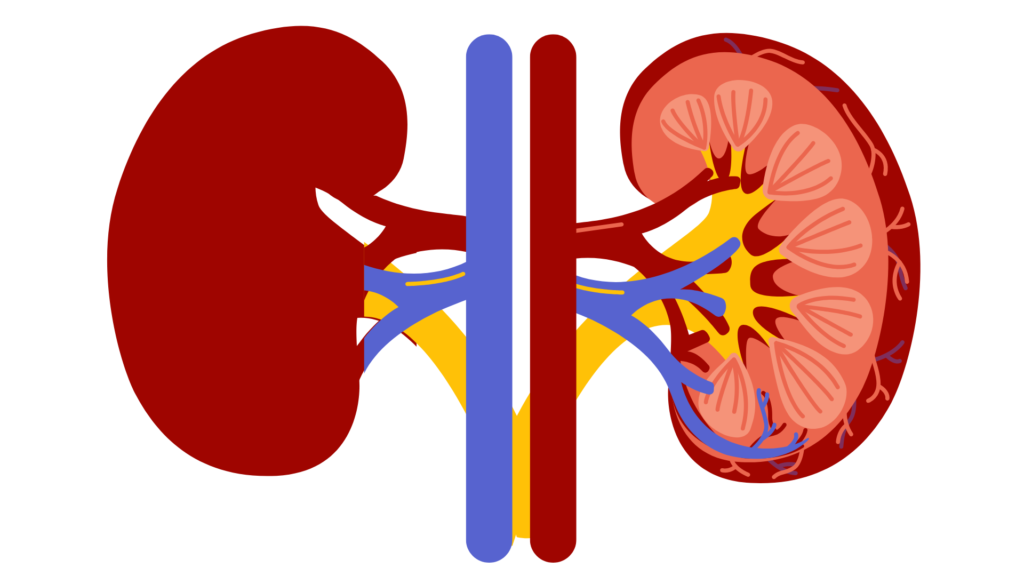Fight Kidney Disease at Its Core
Cutting-Edge Therapies for Lasting Results

At the Centre for Optimum Health (CFOH), we do not treat kidney disease directly. Our approach focuses on providing metabolic therapies that complement traditional treatments, such as dialysis, medications, and lifestyle interventions. We aim to enhance recovery, slow disease progression, and optimize overall health by addressing the underlying biological terrain and metabolic imbalances that contribute to kidney damage. By focusing on the root causes—such as inflammation, oxidative stress, and mitochondrial dysfunction—we offer a comprehensive approach to supporting kidney health and reducing complications.
Our integrated treatment protocols include Hyperbaric Ozone Hemotherapy, Enhanced External Counterpulsation (EECP), and Human Growth Hormone (HGH) replacement. Additionally, we incorporate advanced nutraceuticals like Rapamycin, Dasatinib, Fisetin, Taurine, Lysine, N-Acetylcysteine, L-Carnitine, and probiotics to target the metabolic and inflammatory factors that drive Chronic Kidney Disease (CKD) progression.
1. Hyperbaric Ozone Hemotherapy in Chronic Kidney Disease
Hyperbaric Ozone Hemotherapy, is a powerful ozone therapy that improves kidney health by:
- Reducing oxidative stress: Ozone stimulates antioxidant production in the body, protecting kidney cells from oxidative damage.
- Enhancing oxygen delivery: This therapy improves tissue oxygenation, crucial for combating kidney hypoxia seen in CKD.
- Anti-inflammatory properties: Ozone therapy lowers inflammatory cytokines that contribute to CKD progression.
- Detoxification: It aids in reducing the burden of uremic toxins that accumulate in CKD, such as creatinine and urea.
Scientific References:
- Bocci, V. (2002). Ozone: A new medical drug. Springer Science & Business Media.
- Borrelli, E., Bocci, V., & Zanardi, I. (2015). Hyperbaric oxygen therapy in the treatment of chronic kidney disease: A novel therapeutic approach. Journal of Clinical Trials, 5(1).
2. Enhanced External Counterpulsation (EECP) in CKD
EECP is a non-invasive therapy that boosts kidney perfusion by improving blood flow and stimulating angiogenesis. This offers several key benefits for CKD patients:
- Enhanced microvascular circulation: Improves oxygen-rich blood flow to the kidneys, counteracting microvascular damage in CKD.
- Reduction in kidney hypoxia: By restoring blood flow, EECP mitigates ischemic stress in the kidneys.
- Blood pressure regulation: EECP helps lower systemic blood pressure, reducing a major risk factor for CKD progression.
Scientific References:
- Lawson, W. E., Hui, J. C., & Soroff, H. S. (2000). EECP in the management of chronic ischemia and renal insufficiency. Current Medical Research and Opinion, 16(1), 42-47.
- Lanza, G. A. (2014). Enhanced external counterpulsation in the management of chronic kidney disease: A promising non-invasive intervention. Nephrology, 19(7), 415-422.
3. Human Growth Hormone (HGH) Replacement in CKD
HGH therapy supports kidney health by:
- Enhancing protein metabolism: Preventing muscle wasting and improving nutritional status in CKD patients.
- Reducing inflammation: Decreases inflammatory markers that are elevated in CKD.
- Supporting kidney regeneration: HGH promotes tissue repair and cellular regeneration, potentially slowing disease progression.
Scientific References:
- Kopple, J. D., & Feldman, H. I. (2012). Growth hormone in chronic kidney disease: An anabolic agent to counter protein-energy wasting. Kidney International, 81(3), 214-219.
- Tönshoff, B., & Blum, W. F. (2005). Effects of recombinant human growth hormone in children with CKD. Pediatric Nephrology, 20(9), 1189-1199.
4. Rapamycin, Dasatinib, and Fisetin in Chronic Kidney Disease
- Rapamycin (Sirolimus): Reduces kidney fibrosis and delays CKD progression by inhibiting the mTOR pathway.
- Dasatinib: A tyrosine kinase inhibitor that clears senescent cells, reduces inflammation, and promotes kidney tissue repair.
- Fisetin: A flavonoid that reduces oxidative stress and clears senescent cells, providing anti-inflammatory benefits in CKD.
Scientific References:
- Inoue, M., et al. (2019). Rapamycin and mTOR inhibition in kidney disease: Pathophysiology and therapeutic potential. Nephrology Dialysis Transplantation, 34(7), 1117–1126.
- Kirkland, J. L., & Tchkonia, T. (2017). Cellular senescence: A translational target for the treatment of chronic diseases. Nature Medicine, 23(10), 1266-1275.
5. Nutraceuticals and Probiotics in Chronic Kidney Disease
Our nutraceutical protocols target inflammation, oxidative stress, and metabolic dysfunction, improving outcomes for CKD patients.
Taurine
- Benefits: Reduces oxidative stress and inflammation, two key drivers of CKD progression.
- Mechanism: Protects against kidney fibrosis by inhibiting TGF-β signaling.
Lysine
- Benefits: Decreases proteinuria and supports kidney tissue repair through collagen formation.
- Mechanism: Improves nitrogen balance and prevents advanced glycation end-product (AGE) formation.
N-Acetylcysteine (NAC)
- Benefits: Replenishes glutathione, reducing oxidative stress in CKD.
- Mechanism: NAC is a powerful antioxidant that prevents contrast-induced nephropathy.
L-Carnitine
- Benefits: Improves mitochondrial function and reduces muscle wasting, common in CKD patients.
- Mechanism: Enhances energy metabolism and protects against oxidative damage.
Probiotic Species in CKD
- Lactobacillus rhamnosus GG: Reduces inflammation and strengthens gut barrier function, lowering systemic toxin levels.
- Bifidobacterium longum: Reduces uremic toxins like ammonia, improving gut and kidney health.
- Lactobacillus acidophilus: Lowers levels of indoxyl sulfate and improves overall gut health, reducing systemic inflammation in CKD.
Scientific References:
- Fouque, D., & Koppe, L. (2016). Gut microbiota and CKD progression: The role of probiotics. Journal of Renal Nutrition, 26(6), 433-438.
- Heidari, N., & Fitzgibbon, G. (2018). N-acetylcysteine: A therapy for CKD. American Journal of Kidney Diseases, 71(1), 111-120.
